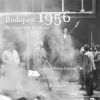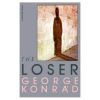Legfrissebb kiadás

|
Falevelek a szélben Magvető kiadó, 2017 |
In Extremis (Patricia Blake, Time, 17 January, 1983)
Kapcsolódó könyv:
The Loser - Penguin, 1984
The Loser - Penguin, 1984
In Extremis
By Patricia Blake
http://www.time.com/time/printout/0,8816,951896,00.html
By Patricia Blake
http://www.time.com/time/printout/0,8816,951896,00.html
THE LOSER by George Konrád Translated by Ivan Sanders; Harcourt Brace Jovanovich; 315 pages; $14.95
George Konrád's novels, each in its own harrowing way, have been maps of contemporary man's journeys to the end of the night. The Hungarian writer's first book, The Case Worker (1974), charted the descent of a compassionate social worker into the degradation and suffering of Communism's underclass. His second, more ideological novel, The City Builder (1978), explored the pathways to the Utopias that have led to police terror and violence. By then it was clear that Hungary's national tragedy had cast up a major writer, in a class with West Germany's Heinrich Böll and the Polish exile Czeslaw Milosz.
In his latest novel, The Loser, Konrád takes the ultimate journey of the modern European, piling up horror upon horror on the way: the Holocaust, the Gulag, the carnage of World War II, the postwar purges in Eastern Europe, the failed 1956 Hungarian uprising. The literature documenting the inhumanity of the age is vast. Yet Konrád's masterly new novel offers fresh insight into the cruel stratagems of totalitarian rule.
Astonishingly, Konrád, 49, still lives and writes in Communist Hungary, where his novel passes from hand to hand in a process known by the Russian term samizdat: self-publishing. He has even been granted permission for a two-year stay in the West. Though Hungary has proved to be more forbearing of dissent than other countries in the Soviet bloc, Konrád is surprised by the degree of tolerance he has encountered at home.
"It is an amazing development," Konrád said on a visit to New York City. "When I returned home in 1979, after a stay abroad, I expected conditions to be the same as they were when I was arrested in 1975, for supposedly having circulated a sociological study I had coauthored. Instead, I found a community of young intellectuals who had established a kind of network of free thought. Thousands of copies of serious magazines are circulating unofficially in mimeographed form. Several hundred copies of my novel have already appeared in samizdat."
Konrád's sweetness of manner and luminous smile belie the visions of violence that invaded his childhood and have informed his fiction. The son of a Jewish shopkeeper, he was eleven years old when his parents were arrested under the Nazi occupation. The boy fled to Budapest and hid with other Jews in a house that was under the protection of a foreign embassy. The young fugitive scrounged for dry beans and moldy sausage. Searching for a relative in a ghetto hospital, he came upon a mountain of bodies that had been machine-gunned by Hungarian Nazis.
The protagonist of The Loser, a Jewish intellectual called T., has similar memories: "I look down in the [hospital] yard; a pile of scantily dressed dead bodies with clambering hands and feet reaches up to the first floor." In 1941, T. is arrested as a Communist revolutionary. Torture follows—the first of many scenes of a systematic cruelty that cuts through Konrád's novel like an endlessly resonating scream. T. is then sent to the Ukrainian front in a forced-labor unit attached to the German army. The atrocities pile up. Konrád has a special genius for evoking mass murder, whether he is recounting the unspeakable horror of burying fallen soldiers in a vast grave or describing the stacks of bodies of Hungarian villagers who have been hanged or shot by the retreating Nazis. The density of specific detail Konrád provides is overpowering in its effect.
Escaping from the Nazis, T. becomes a Soviet partisan and dons a Red Army uniform. Gun in hand, he turns from the role of victim to that of executioner. As a Hungarian Communist, he joins in the postwar Soviet military occupation of his country, but is sickened by the task. "With dry eyes I wept ... for a people that had fallen into our hands and now could not extricate its soft body from our clutches. We raped our people; the place would soon be teeming with our bastards—the born liars." Events and doctrines soon replica designer bag turn against him, and he loses his faith in Communism. After two terms of imprisonment and torture at the hands of his former comrades, T. asks himself: "If you leave the culture in which you are immersed up to your ears, where the hell do you go? The insane asylum."
The asylum is Konrád's metaphor for a post-Stalin totalitarian society, after terror has subsided and all the bodies have been neatly buried. "When I first conceived of this novel, I knew it would end in the madhouse," he recalls. "So I arranged to work in one for four months." The actual asylum is a psychiatric halfway house situated in a beautiful chateau, once the property of a Hungarian count. "The door is not quite open, of course," Konrád says. "There is a guard at the gate who asks for your permit to leave. The patients get a lot of sedatives and tranquilizers—not chemical but ideological. They are unaccustomed, after all, to directing their own lives. We are not very healthy in Hungary. Still, there is a hole in the fence and the doctors tolerate it." That hole is large enough for ideas to break out, but it is too small for the whole human being. As The Loser suggests, the doctors, like the patients, like T. himself, are all inescapably the captives of their lunatic history.
—By Patricia Blake
George Konrád's novels, each in its own harrowing way, have been maps of contemporary man's journeys to the end of the night. The Hungarian writer's first book, The Case Worker (1974), charted the descent of a compassionate social worker into the degradation and suffering of Communism's underclass. His second, more ideological novel, The City Builder (1978), explored the pathways to the Utopias that have led to police terror and violence. By then it was clear that Hungary's national tragedy had cast up a major writer, in a class with West Germany's Heinrich Böll and the Polish exile Czeslaw Milosz.
In his latest novel, The Loser, Konrád takes the ultimate journey of the modern European, piling up horror upon horror on the way: the Holocaust, the Gulag, the carnage of World War II, the postwar purges in Eastern Europe, the failed 1956 Hungarian uprising. The literature documenting the inhumanity of the age is vast. Yet Konrád's masterly new novel offers fresh insight into the cruel stratagems of totalitarian rule.
Astonishingly, Konrád, 49, still lives and writes in Communist Hungary, where his novel passes from hand to hand in a process known by the Russian term samizdat: self-publishing. He has even been granted permission for a two-year stay in the West. Though Hungary has proved to be more forbearing of dissent than other countries in the Soviet bloc, Konrád is surprised by the degree of tolerance he has encountered at home.
"It is an amazing development," Konrád said on a visit to New York City. "When I returned home in 1979, after a stay abroad, I expected conditions to be the same as they were when I was arrested in 1975, for supposedly having circulated a sociological study I had coauthored. Instead, I found a community of young intellectuals who had established a kind of network of free thought. Thousands of copies of serious magazines are circulating unofficially in mimeographed form. Several hundred copies of my novel have already appeared in samizdat."
Konrád's sweetness of manner and luminous smile belie the visions of violence that invaded his childhood and have informed his fiction. The son of a Jewish shopkeeper, he was eleven years old when his parents were arrested under the Nazi occupation. The boy fled to Budapest and hid with other Jews in a house that was under the protection of a foreign embassy. The young fugitive scrounged for dry beans and moldy sausage. Searching for a relative in a ghetto hospital, he came upon a mountain of bodies that had been machine-gunned by Hungarian Nazis.
The protagonist of The Loser, a Jewish intellectual called T., has similar memories: "I look down in the [hospital] yard; a pile of scantily dressed dead bodies with clambering hands and feet reaches up to the first floor." In 1941, T. is arrested as a Communist revolutionary. Torture follows—the first of many scenes of a systematic cruelty that cuts through Konrád's novel like an endlessly resonating scream. T. is then sent to the Ukrainian front in a forced-labor unit attached to the German army. The atrocities pile up. Konrád has a special genius for evoking mass murder, whether he is recounting the unspeakable horror of burying fallen soldiers in a vast grave or describing the stacks of bodies of Hungarian villagers who have been hanged or shot by the retreating Nazis. The density of specific detail Konrád provides is overpowering in its effect.
Escaping from the Nazis, T. becomes a Soviet partisan and dons a Red Army uniform. Gun in hand, he turns from the role of victim to that of executioner. As a Hungarian Communist, he joins in the postwar Soviet military occupation of his country, but is sickened by the task. "With dry eyes I wept ... for a people that had fallen into our hands and now could not extricate its soft body from our clutches. We raped our people; the place would soon be teeming with our bastards—the born liars." Events and doctrines soon replica designer bag turn against him, and he loses his faith in Communism. After two terms of imprisonment and torture at the hands of his former comrades, T. asks himself: "If you leave the culture in which you are immersed up to your ears, where the hell do you go? The insane asylum."
The asylum is Konrád's metaphor for a post-Stalin totalitarian society, after terror has subsided and all the bodies have been neatly buried. "When I first conceived of this novel, I knew it would end in the madhouse," he recalls. "So I arranged to work in one for four months." The actual asylum is a psychiatric halfway house situated in a beautiful chateau, once the property of a Hungarian count. "The door is not quite open, of course," Konrád says. "There is a guard at the gate who asks for your permit to leave. The patients get a lot of sedatives and tranquilizers—not chemical but ideological. They are unaccustomed, after all, to directing their own lives. We are not very healthy in Hungary. Still, there is a hole in the fence and the doctors tolerate it." That hole is large enough for ideas to break out, but it is too small for the whole human being. As The Loser suggests, the doctors, like the patients, like T. himself, are all inescapably the captives of their lunatic history.
—By Patricia Blake











































































































































